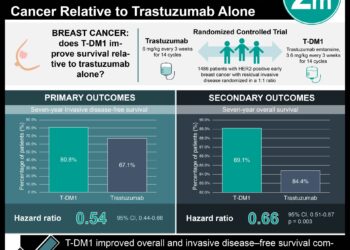Gains in life expectancy linked with gains in health expectancy in old age
1. As life expectancy increased for those over the age of 65, the years free of any cognitive impairment also increased, whereas years with mild or moderate-severe cognitive impairment decreased.
2. More increases in mild disability occurred than did years free of disability. This was mainly because of increases in mild disability in comparison to more severe disability.
Evidence Rating Level: 1 (Excellent)
Study Rundown: This study aimed to assess change in health expectancies at age 65 or older between 1991 and 2001. Prevalence estimates for levels of self-perceived health, cognitive impairment, and disability in activities of daily living were provided via results from the Cognitive Function and Ageing Studies done in 1991 and 2001 (CFAS I and CFAS II, respectively). Gains in life expectancy at age 65 years were accompanied by an equivalent gain in years free of any cognitive impairment and decreased years with mild or moderate-severe cognitive impairment. Gains in years of self-perceived health categorized as good and excellent were also made. Gains in disability-free years were smaller, likely due to the increase in mild disability. This study was strengthened due to the identical design and methodology used across decades in the CFAS I and II. Limitations of this study included non-response and subjectivity of measures used.
Click to read the study in The Lancet
Relevant Reading: Health, functioning, and disability in older adults—present status and future implications
In-Depth [retrospective cohort]: This population study aimed to assess how health expectancies at 65 years and older changed between the years 1991 and 2011 in England. Baseline data from 7,635 participants in CFAS I and 7,796 participants in CFAS II were analyzed and compared for three health measures: self-perceived health (rated as excellent-good, fair, or poor); cognitive impairment (rated as moderate-severe, mild, or none via Mini-Mental Status Exam score); and disability in activities of daily living (rated as none, mild, or moderate-severe).
Life expectancy at 65 years of age increased between 1991 and 2011 by 4.5 years in men and 3.6 years in women, and were accompanied by increases in years free of any cognitive impairment (4.2 years [95% CI 4.2 – 4.3] in men and 4.4 [4.3 -4.5] for women). Years with mild or moderate-severe cognitive impairment decreased. Years in excellent or good self-perceived health increased by 3.8 years (95% CI 3.5 – 4.1) for men and 3.1 years (2.7-3.4) for women. Due to increases in mild disability, years free of disability did not increase as much as those rated as excellent-good self-perceived health or those free of cognitive impairment (0.5 years [0.2 -0.9] for women and 2.6 years [2.3-2.9] for men).
Image: PD
©2015 2 Minute Medicine, Inc. All rights reserved. No works may be reproduced without expressed written consent from 2 Minute Medicine, Inc. Inquire about licensing here. No article should be construed as medical advice and is not intended as such by the authors or by 2 Minute Medicine, Inc.






![Reduced neuronal BRCA1 associated with decreased DNA repair in Alzheimer’s disease [PreClinical]](https://www.2minutemedicine.com/wp-content/uploads/2015/12/DNA_Furchen_edited-75x75.png)
